Exactly what it says on the tin, bruv.
Grendel was a good book. Grendel himself is a fantastic pointless man as crybully. But all of the mortals struggle. Grendel and other mortals are most like the Dragon and have the Dragon scent when they transcend their pathetic meat forms to grasp eternity. By inhabiting the story-forms, they become things beyond time and more than meaninglessness. What angers Grendel most is that someone might try to match his pitifulness. But at the same time, he drives them towards it. When he sees Unferth trying to live a story, he destroys him. Simultaneously, he wants to drag people to his level while also remaining the most pitiful. He’s the happiest when he can be the monster, and this is also when his dragon scent is strongest. But he loves to hear the stories too. We are so eager to defy structures because we see them as impositions on our absolute freedom. But we are defined by our relations to others and the world. If we never make a mark, what are we? By breaking free of these relations in their entirety, we abolish our own meaning. We become Grendels, pointless monsters, in love with our own pitifulness but afraid to admit it. Everyone is so wrapped up in ironic and gesture that nothing sincere or eternal remains. We cut off our families because we are afraid to love – and hate – them. We abandon friends. Where does that lead us? The Dragon. And the Dragon as timeless thing is no accident. The Dragon is Nietzsche’s timeless value creature, with an eternal and recurrent lifecycle. The Dragon is the Ubermensch completed, the Ubermensch the larval Dragon. Unferth is only a mortal man, and thus must steel himself with mere words of heroism. Beowulf *is* heroism. And thus Beowulf can restore meaning, as the Ubermensch, and banish the hideous nihilism.
Does Grendel sacrifice himself to religion, or does religion sacrifice Grendel? Does it matter?
There is a difference between sleaze and filth, and this is the difference between the crime wave coming now and the high crime times of the 1980s. Sleaze comes out of an unrestricted freedom, and this freedom begets psychological emancipation. An indifference to tired pieties. The crime of that day was *selfish*. The crimes of today are *selfless*. Crime then, and the accompanying filth, came from an abundance of ego which denied the rights or wellbeing of anyone around them, so eager was it to get some for itself. It is the behavior of the outlaw.
By contrast, the selfless criminal, the anarchist, behaves not to fulfill a hunger within them so strong it cannot be denied, but as a yearning for meaning, for something to coalesce self around. It is empty. It is narcissist in the Lasch sense. The anarchist struggle becomes an attempt to construct a cosmology, a narrative, some thing which will justify the person. The totally selfish person needs no justification. Their own hunger is the only meaning in the world. This is not to excuse it. But it is different. “Natural Born Killers”. That’s the crime of egoism. They have a message, as savage and brutal as it is. They have desires. They are full, so full, they impinge on others, and take from the weak to fill their own bellies.
And that is why the 60s, 70s, 80s, saw an outpouring of art. Art was the spontaneous expression of these selfish, cruel selves. But they were *selves*. Why is the modern Leftist censorious? Because they are a devourer of art, because their self must consume art, not create art, because there is a hole there. So it goes. Once as tragedy, again as farce. And that’s the difference between sleaze and filth. The filth is a product of sleaze, but it isn’t sleaze. Sleaze is the run-down nature of absolute egoist freedom. The filth cult of the modern left is just a cargo cult to sleaze, vainly hoping to be the same.
Let’s talk nobility!
Imagine! Grand palaces! Luxurious feasts! Dictating the course of world history with your whims! Conquering! Being a tiny king in your own right!
Yeah, I’m not talking about those guys. No counts or dukes or princes today.
I’m talking about the baron. How much does a modest manor produce? Between 20 and 30 pounds sterling in Britain. In France, just over 20 livre tournois. Today, this purchases about $20,000 in goods. But we don’t care about that. We care about relatives. I’ll explain later. This is about 2500 days wages. Converting back to modern money, 2500 days wages is about $200,000. So a manor produces about $200k/yr in income. How many manors does a baron own? Well, some own several. Some are even as mighty as a count or duke! But probably not. You see, the medievals did do censuses. In the County of Champagne in 1252, the count had 1182 fiefs under him. 42% were held by knights, 39% were held by bourgeois, 15% were held by barons, and 5% by clerics. The average amount of manors for a fiefholder was ONE, regardless of the official title. Single manor. But what about Britain? British barons are so important! Yeah, title deflation. Norman barons became major landholders in the new England. The English equivalent to the baron is the gentry. I will treat knights, barons, untitled lords, gentry and high bougies as interchangable.
So what did the barons do? So what are the barons? The barons are the people who rule your little shit village for the great lord, the Count, who can’t be arsed. He’s too important. And in times of trouble, they are marshalled for war. That was their original purpose. There are tons and tons and tons of these guys. Whenever you hear a historian quote a stat like “France had 1% nobility” or “Russia had 2% nobility”, by weight, that’s all fucking barons. They’re everywhere. The British peerage is a few hundred people. How many French? About 200 Frenchmen were ranked Count or above in medieval France. That’s not a lot of dudes. In fact, it basically rounds to zero. You may be noticing something similar in our lives. Millionaires and billionaires, perhaps? There are a few thousand billionaires ON EARTH. We’ll return to that and many other things later. The role of the barons was intricately tied to the feudal regime. They administered its lowest levels, managed its peasants, and fought its wars. So when early modern states formed with professional armies, they were gone.
Right? In evolution, Nature doesn’t come up with new organs willy-nilly. Limbs are adapted into other kinds of limbs. Systems are repurposed. So too with memetics.
The new system needed a labor pool to staff it. The baronage is dead. Long live the baronage. Why are college students upset when they have to be baristas? One could say it’s the income, which is terribly low. But they won’t be tradesmen or factory workers either, even when those can easily pay high 5 figure incomes. No, they want particular jobs. What jobs? Things like, I dunno. Doctor, Engineer, Lawyer, Banker, Bureaucrat, Professor.
What jobs did the baronage take up after the 16th century Crisis of the Nobility?
Doctor.
Engineer.
Lawyer.
Banker.
Bureaucrat.
Professor.
College degrees are minor titles. Always were. So, recall the average incomes of a barony? $200,000? Familiar, eh? What are the average incomes of a midcareer BigLawyer, Software Engineer, or Banker? About $200,000?
Applying Piketty’s 5% land value rule, we find a barony is worth $4mm. The average wealth of a US millionaire. Funny how that works. And what did they need the money for? Maintenance of honors. So dowries, housing, and… college tuition.
It all starts to click, doesn’t it?
All these figures are constant over time because the social-material relations have not changed in 1000 years. This is the dead hand of feudalism reaching into the present. Material conditions remain the same because social-material relations remain the same, regardless of whatever ideological garnish you put on. Call them professionals, managerials, nomenklatura…
The Eternal Baron. It is often said that the 19th century marked a new crisis of the nobility. And it did. But don’t we still have doctors, lawyers, etc? Of course. The decline of the traditional landowner was a minor crisis to be sure. But it merely finalized the shift to professionalization. But what was changing? And changing in a big way? Capitalism. The old world was being upended, and with it, the social order. Peasants became migrant farm labor or prole city workers. The communal village was destroyed. The *status* of the nobility was under attack. Remember our old friend, the haute bourgeois? In the middle ages, we see he earns about the same as the baron. They’re peers. The baron and the boat dealer are friends.
In the 19th century, the bourgeois stops being a boat dealer. And now he earns 100x what you do. Engels’s father is a factory owner, a typical New Man, a bourgeois. And he hates what Engels writes. So how can Engels always get a living? His mother. His mother adored him and gave him her moral code and values.
She was an aristocrat.
And Marx married Jenny von Westphalen.
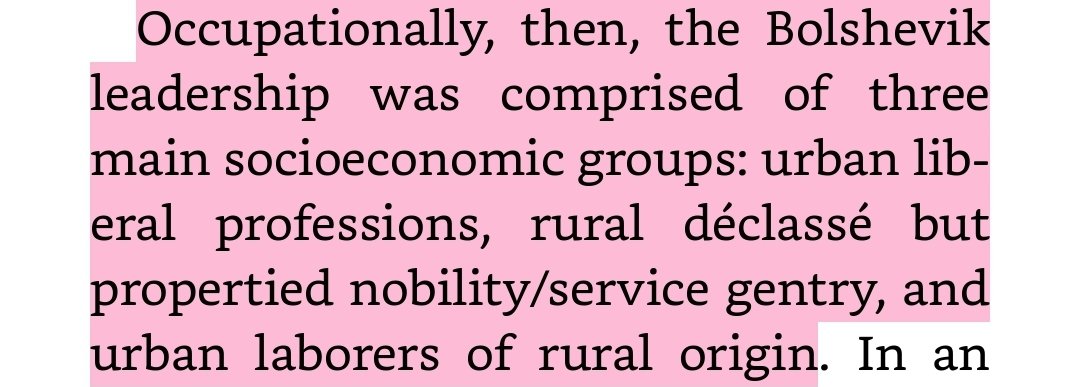
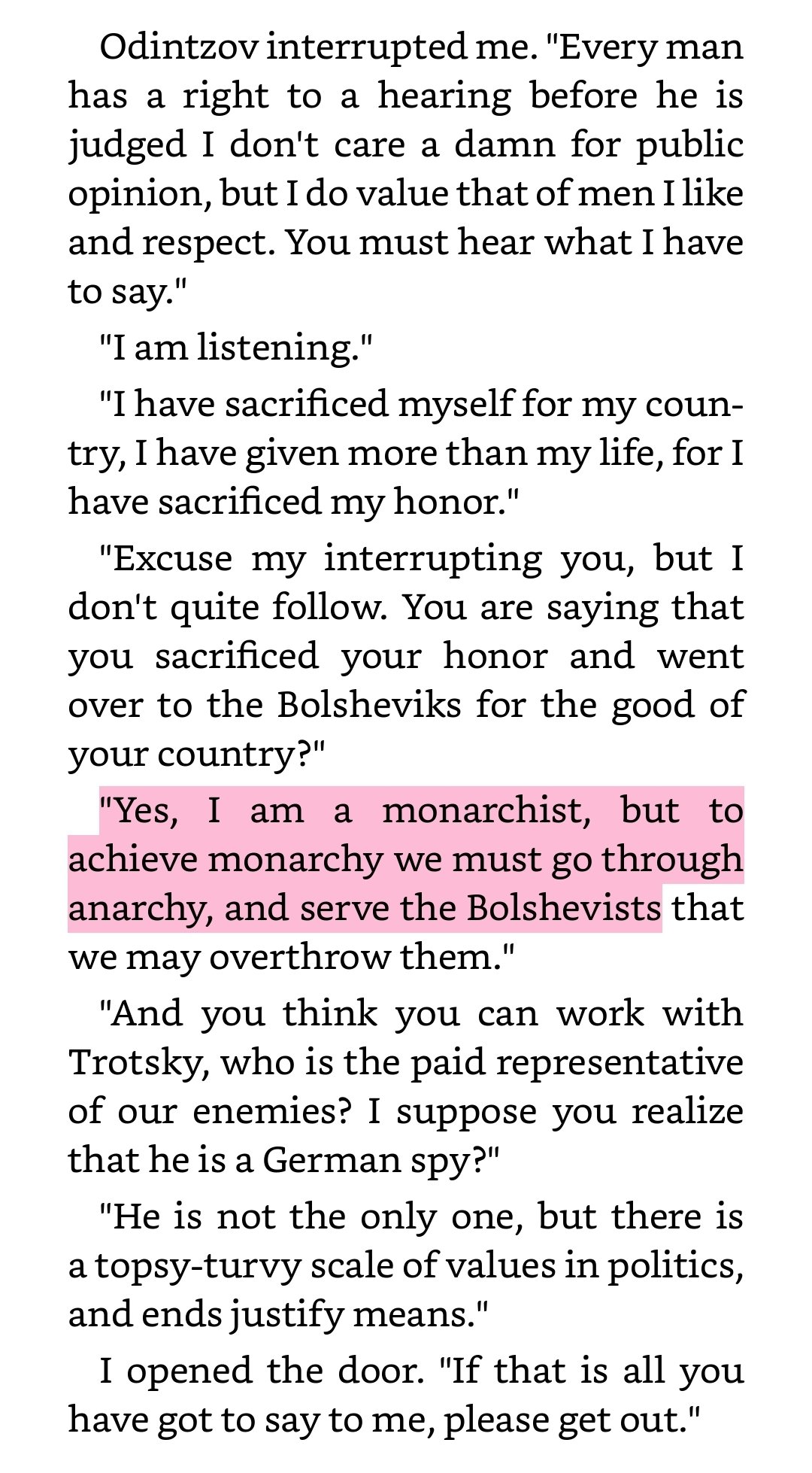
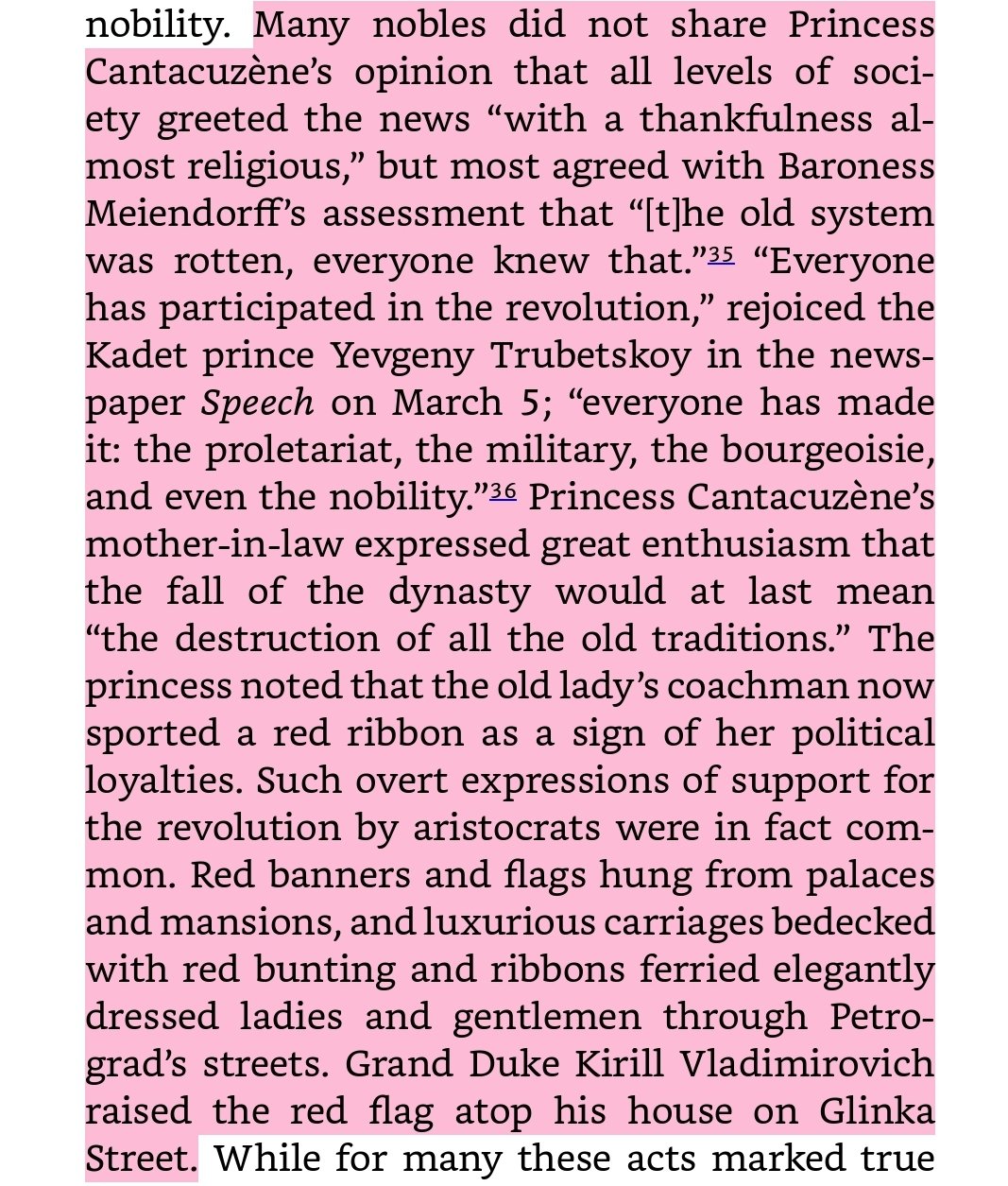
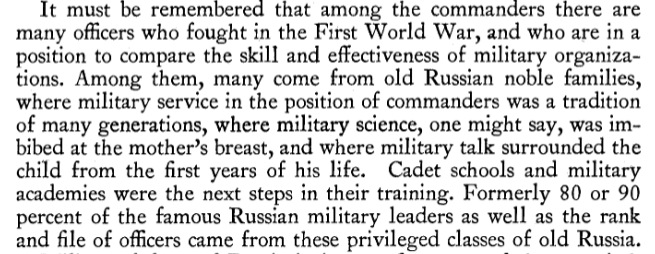
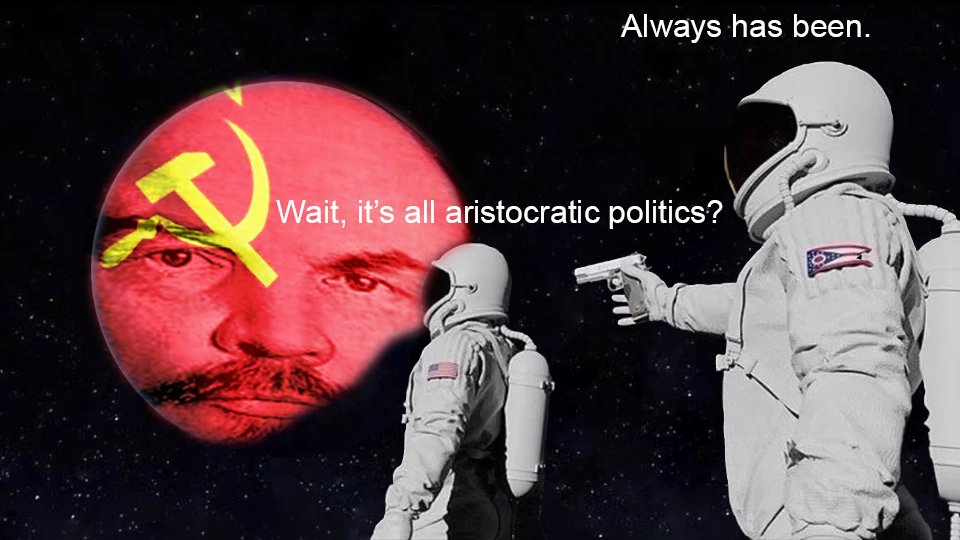
And why? Imagine those peasants, whom you have lived with, loved, cared for, and struggled with, for a thousand years, turned into grist for Satanic mills. Their children devoured by machines. Their lands despoiled by belching steel monsters run by migrants for a profit. Your communal village, destroyed. Overrun by foreigners. Your nursemaid’s family, gone. As Marx says, capitalism reduces the qualities of the proles to quantities.
Numbers. Data points in a spreadsheet. Dehumanization. Atomization.
All that is solid melts into air. Welcome to Hellworld.
There was only one thing to do. Make common cause with the peasants and proletarians being destroyed by this system and destroy Moloch.
Revolt against the Modern World.
Tragedy is the pain of facing irresistible fate. All politics is material interests, not ideology. Always remember that.
Blessed proletarians, will you join me again?
We will not eat the bugs.
And we will not go gently into that good night.
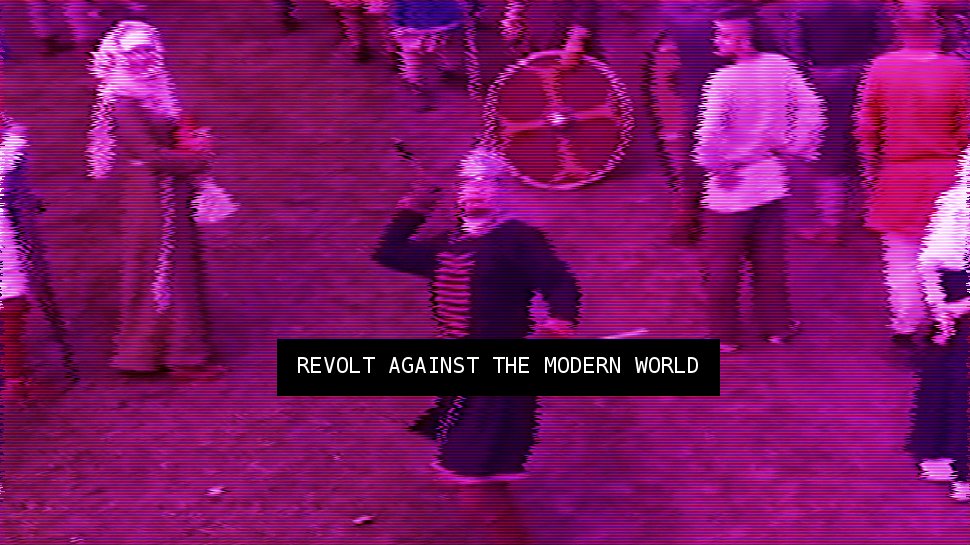
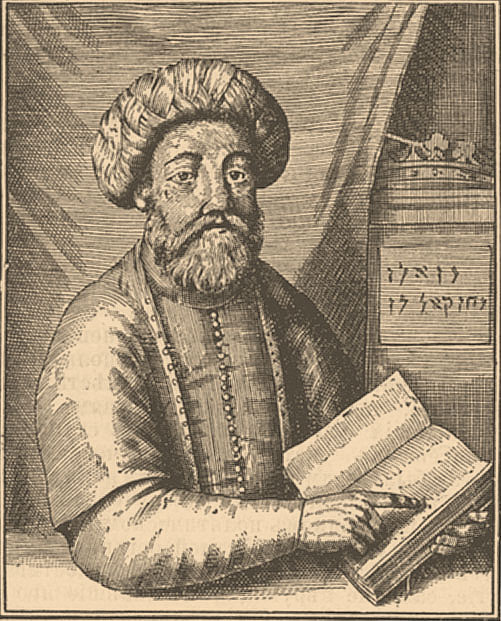
In the year 1666, a strange thing happened. A rabbi from Turkey, Sabbatai Zevi, had declared himself the Messiah and was gathering up quite the following. He was marching to Constantinople (still of that name in that day) where he would confront the Sultan and depose him.
When he arrived, he did not depose the Sultan. On the contrary, he submitted – totally – not only surrendering his mob, but converting to Islam. The Sultan gave him a modest pension but later revoked it, because the man was troublesome. A few followers remained, but only a few. They disappeared back into Judaism or converted into Islam, like their leader. A few stubborn holdouts remained. About a century later, they rallied behind a leader, Jacob Frank, who claimed to be Zevi’s reincarnation. But Frank also converted, to Catholicism. Thus ended a curious footnote in history, as the Frankists followed their leader into Catholicism and Mother Church, assimilating into Christian Polish society. So it goes.
And this is where the textbooks end. So what did these curious people believe? Some of it may be familiar. They believed that the God that others believed in was a false God, a material God, a demiurge that created a world of wickedness, and that the true God had to be redeemed through special knowledge. And they were feminists! Yes, they believed in #girlbosses, slay. There could even be a female Messiah, and women had to be delivered from the bonds of marriage, a wicked, patriarchal concept. They were free, like us.
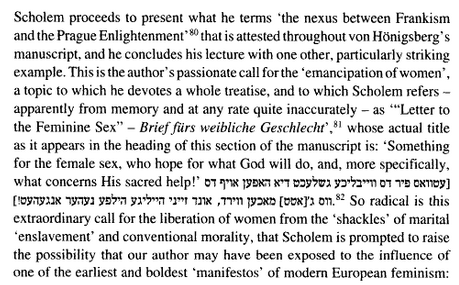
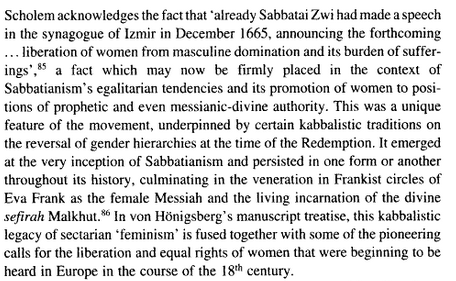
Is it any wonder that the like were drawn to the Enlightenment? They found themselves influencing movements as disparate as Enlightenment liberalism, Reform Judaism, and even @bog_beef‘s favorite, the Quakers.

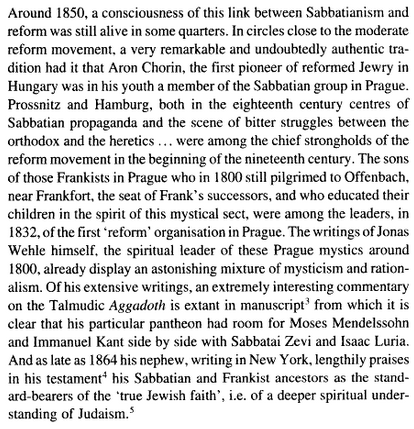

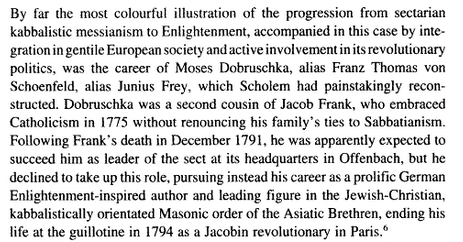
So obviously they were hounded and hunted by the authorities. Such bigots never appreciated the Sabbateans in their own time. Orthodox Rabbis and Christian authorities attempted to root out this heresy, which was spreading both high and low.
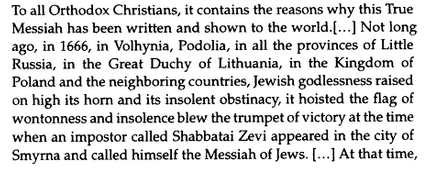

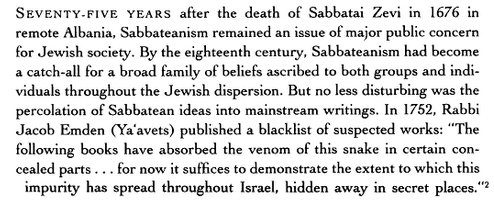
Some, uneducated as they were, claimed the Sabbateans were engaged in magic, mysticism, strange rituals…
Sacrifices?
Ridiculous notions, all absurd.
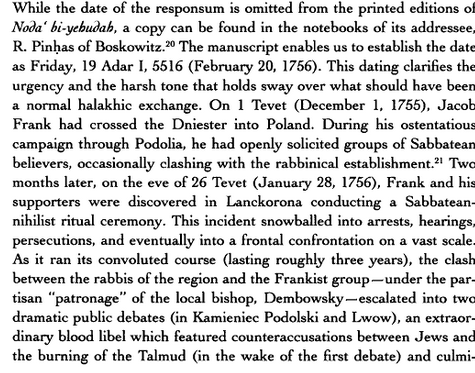
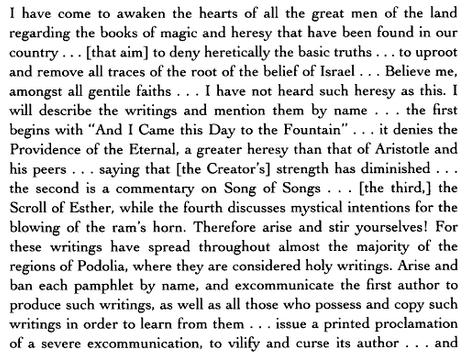
After all, the Frankists had many friends, distinguished friends. They had protectors among powerful Christian magnates, such as the aforementioned Bishop Dembowsky, but also other wealthy Polish Christians had taken an interest in Sabbateanism, as well as wealthy Jews.


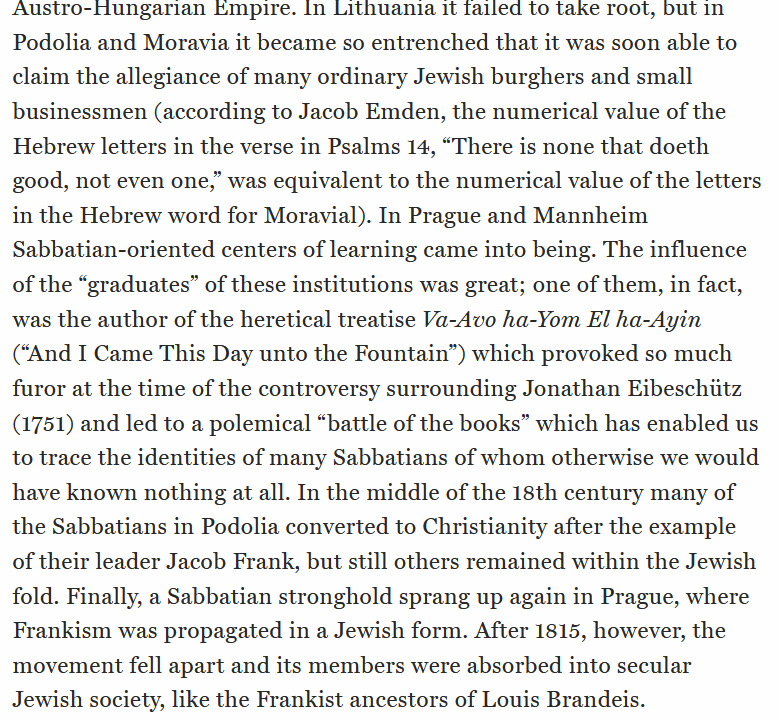
The influence of Sabbatai and Frank immediately calls to mind other charismatic religious figures. One obvious parallel is, of course, Rasputin. As we all know, this mad monk, unkempt and wild, quickly rose to prominence in the Russian court. Why? Well, the Tsar’s son had a terrible disease: hemophlia. But Rasputin could make his son well using his special technique of hypnosis. Of course, those outside the royal family didn’t know this. They were disgusted by this man and his disgusting and immoral behaviors. Rasputin slept around. Rasputin seduced noble ladies. And most of all, Rasputin had terrible hypnotic eyes that could draw anyone in. There is an essence in the eyes. A magic to them. In the eyes are marked terrible, horrible things. Princess Marat saw the power of his eyes.
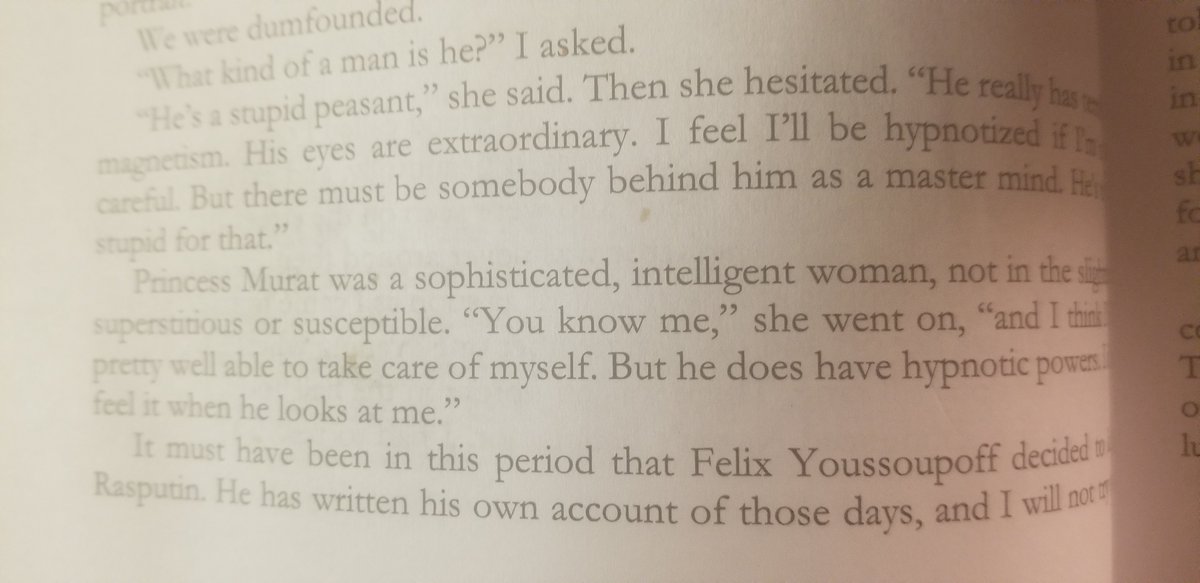
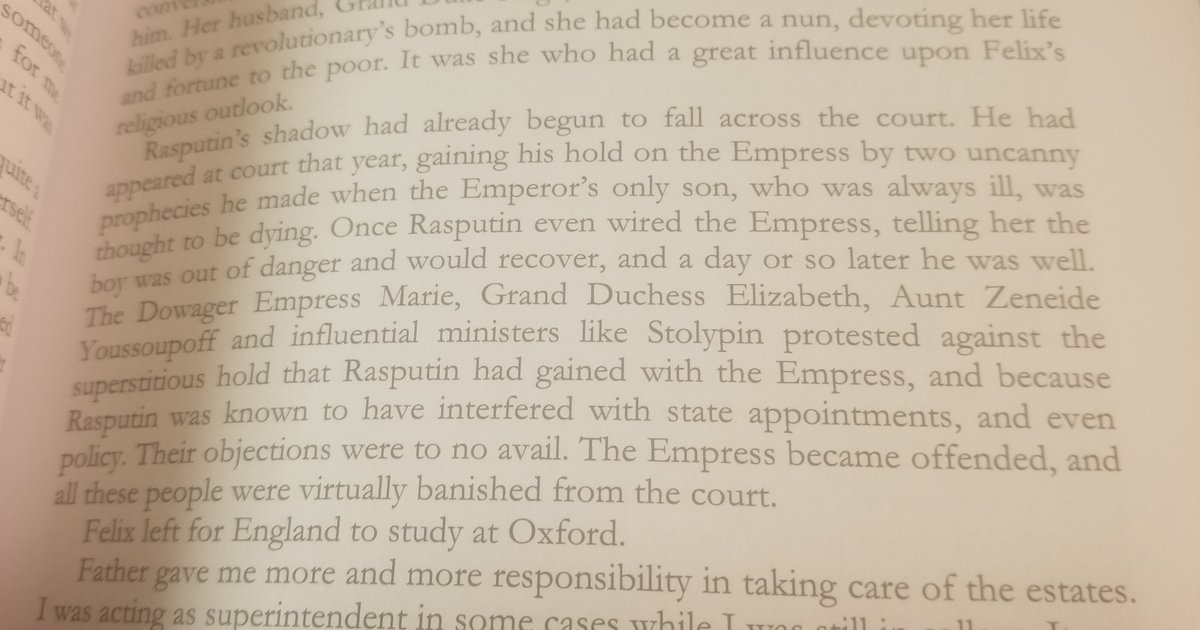
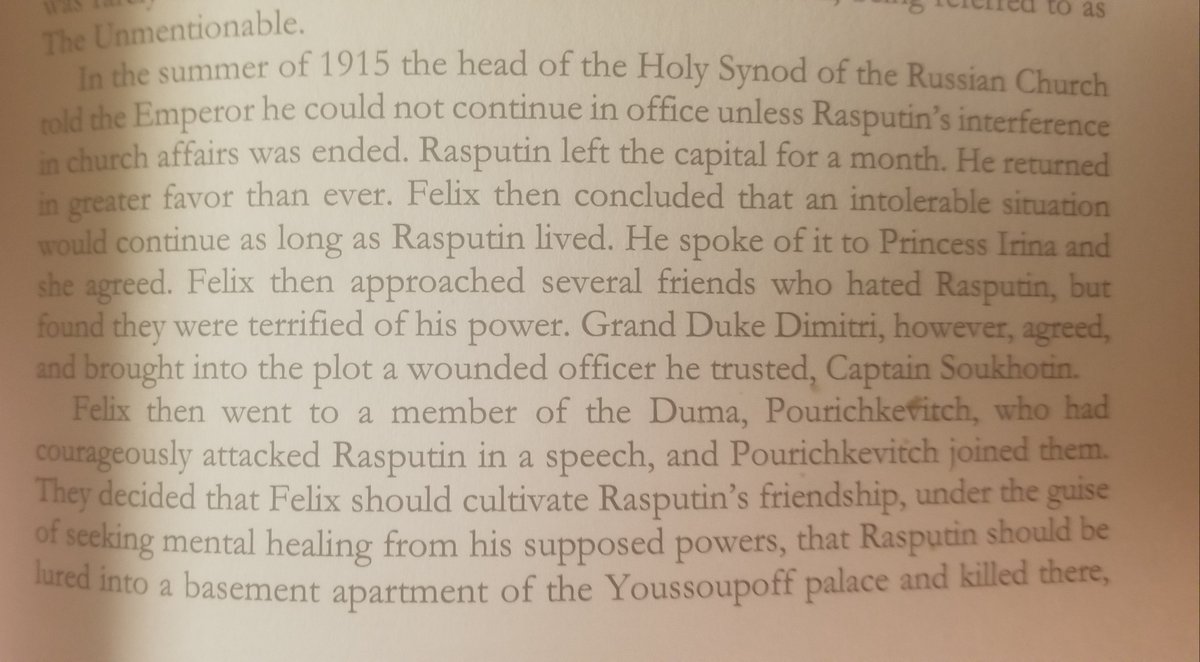
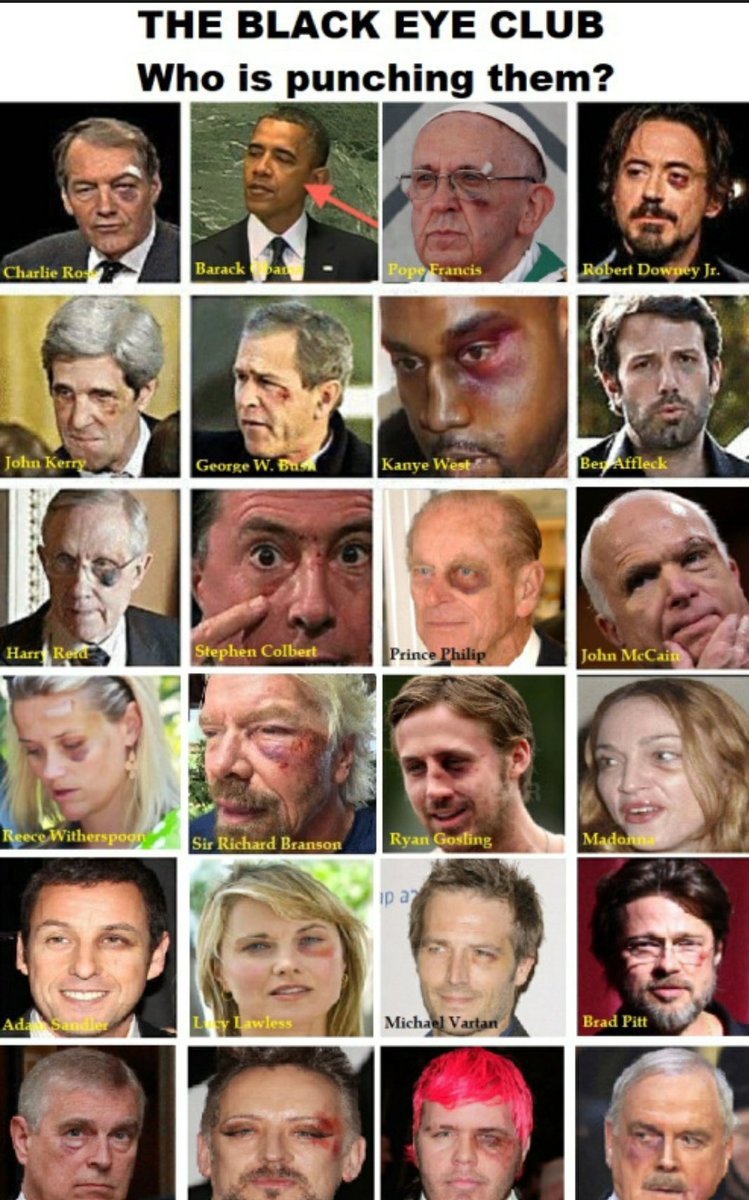
What beliefs did Rasputin have? Although he was not a Whip himself, Rasputin was influenced by the Whips and their doctrines of holy sin and magical sex. The struggle of sin led to the heights of redemption. Holy sin.
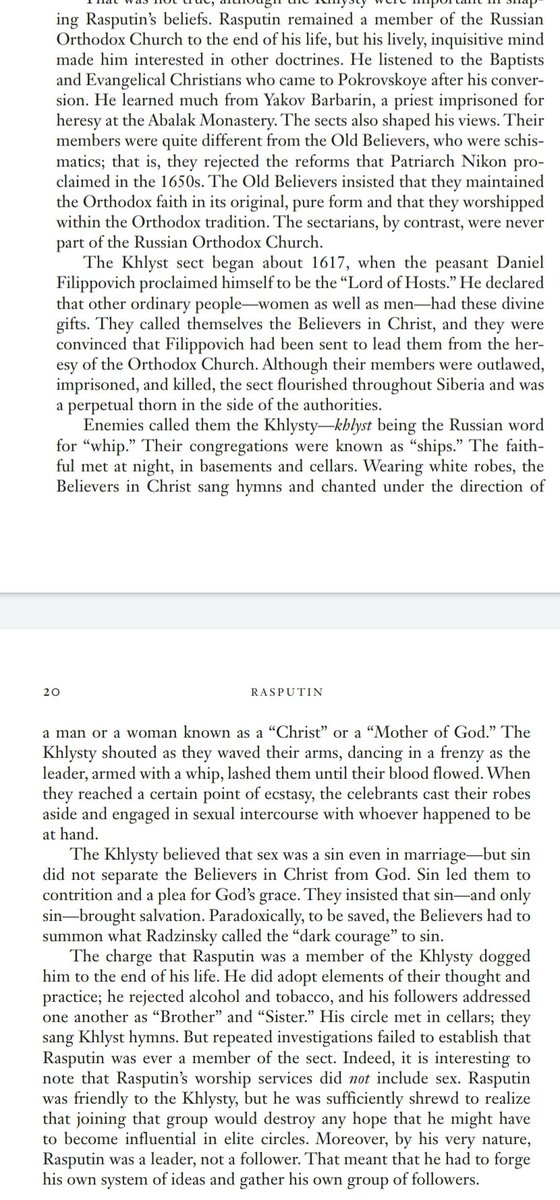
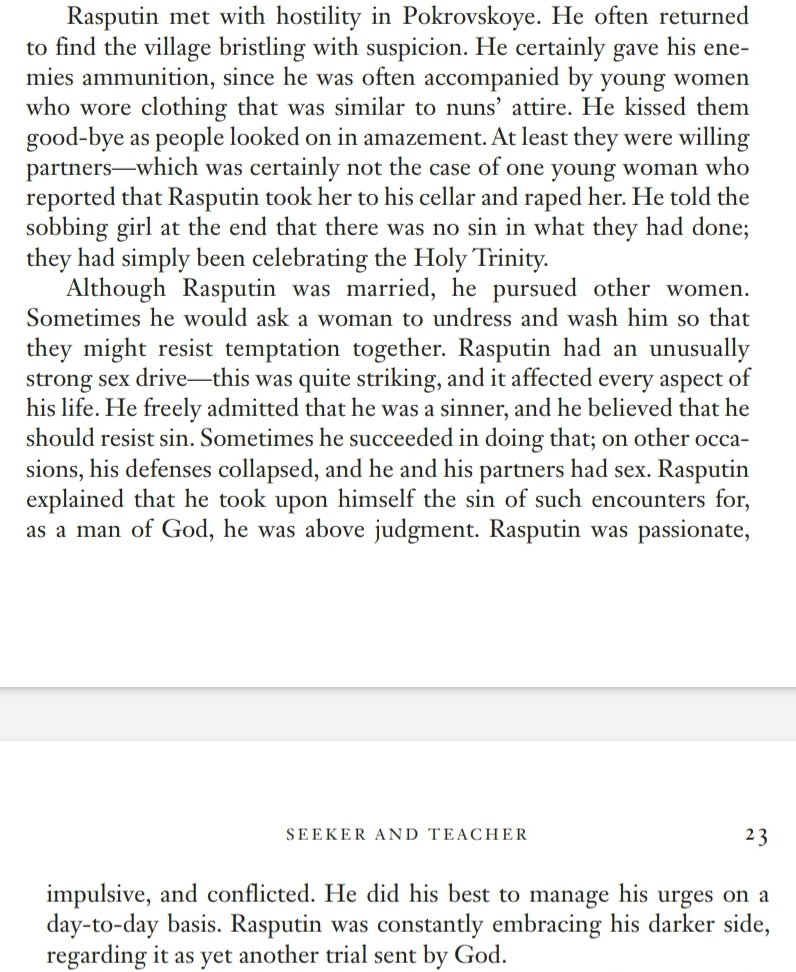
His influence was vast. Trotsky himself remarked on this “leprous camarilla” ruling the state. They practiced magic. They had sex. They had sex… with children. Some as young as 7. “Widespread child seduction had become associated with the ‘best’ members of society.”
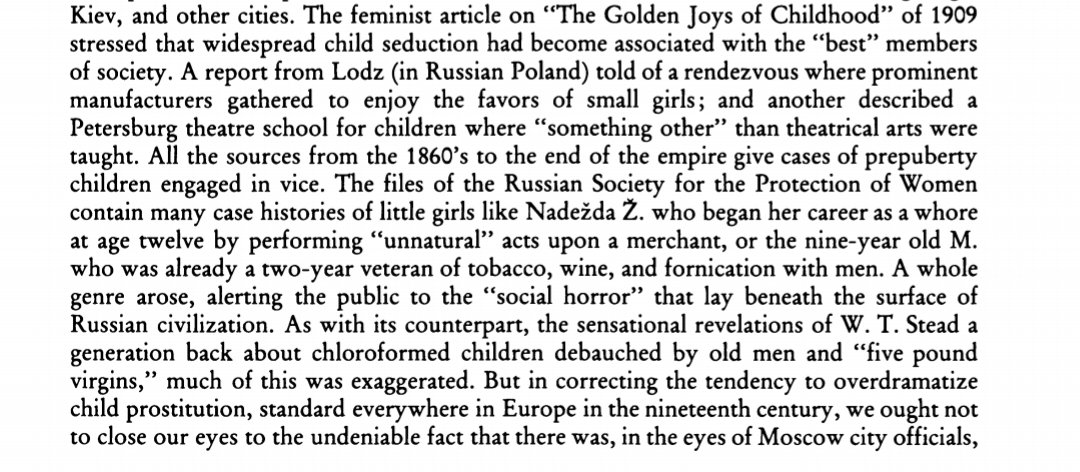
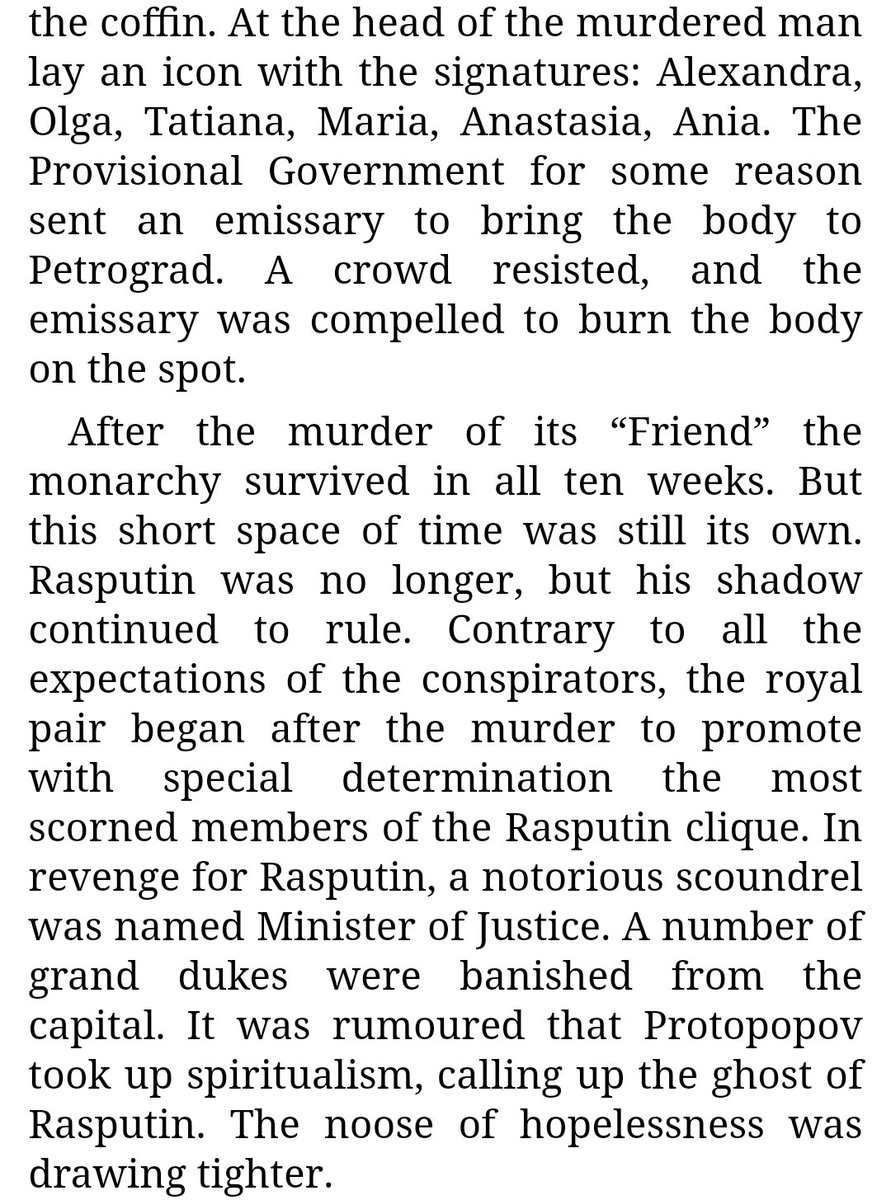

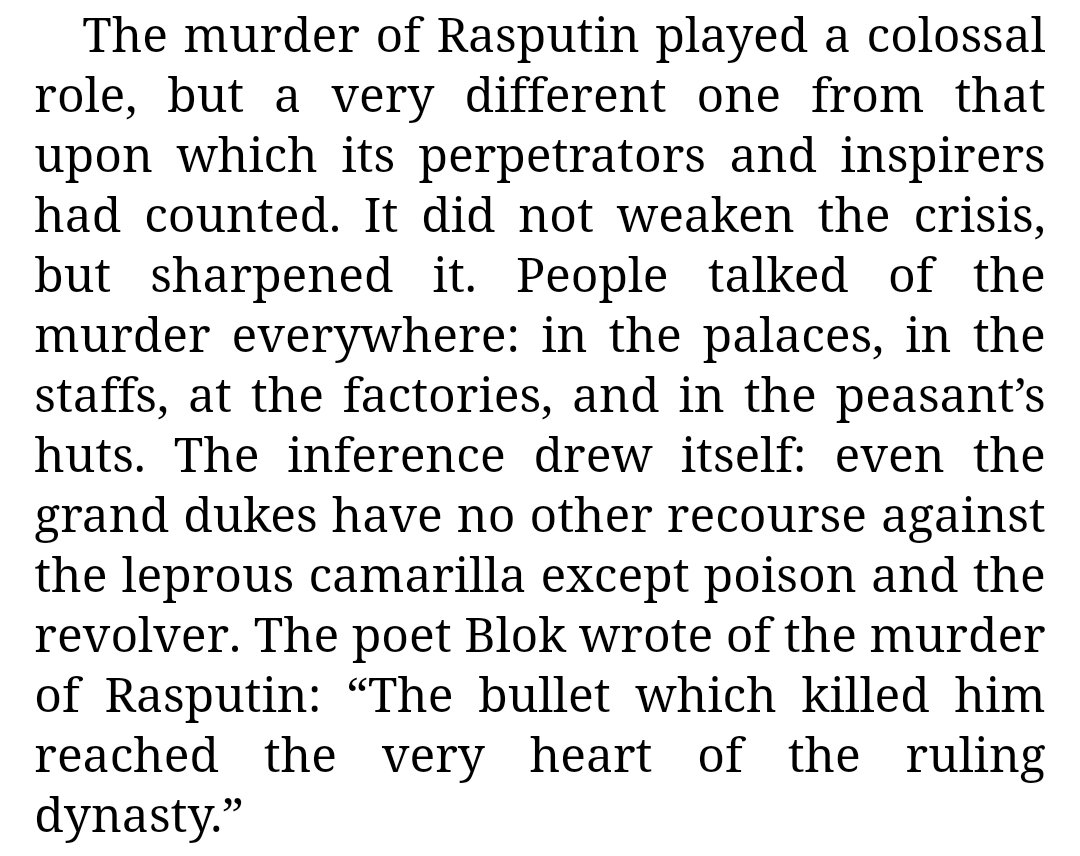
That is what held sway over the monarchy.
So let’s return to the Sabbateans. What did they believe in? You see, the conversion of Sabbatai Zevi was not an apostasy, but a sacrament. To save the world, Zevi had to pass into the world of gentiles, which meant converting. And so too did Frank. Zevi became a Muslim and Frank became a Catholic.
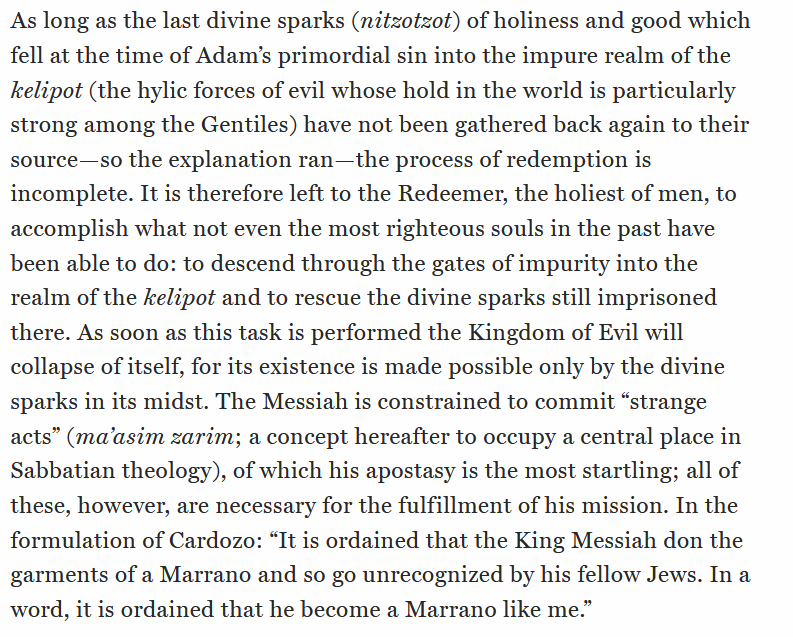
So what did these Sabbateans, these Frankists believe? They believed that they had to join their Messiah’s fight and do as he did.
Firstly, they too had to falsely convert, and enter the kelipot, the Kingdom of Evil. Their true faith would be that of the prophet of 1666.

But their false faith would embed them among Quakers, Reform Jews, heretical Orthodox and Reformed Christians, Enlightenment thinkers, Masons, and all manner of people. There they would spread their beliefs. And what were their beliefs? Why, the same as Rasputin, of one of these very heretical sects. Holy Sin. Sex Magic.
And… other things.
In the darkness, they helped each other prosper.

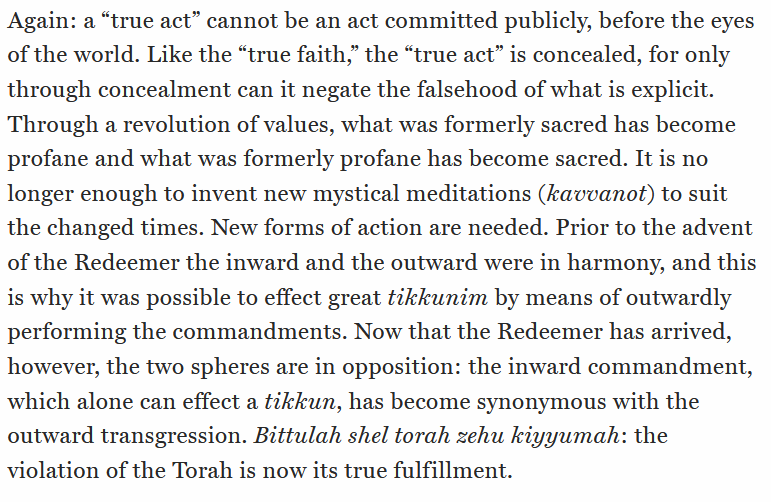

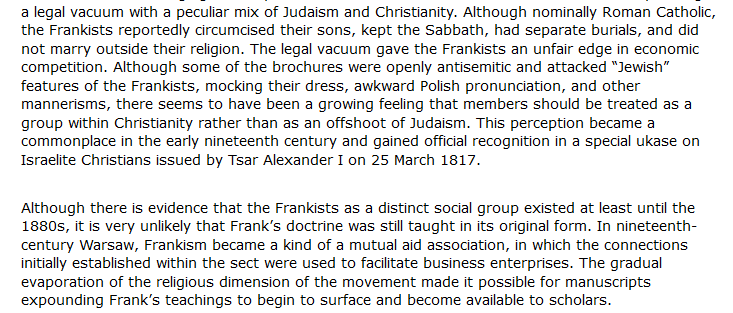
It may be instructive to inform you that Sabbatai’s name? It means Saturn.
The Sabbateans were the Saturn worshippers. They infiltrated sects and ideologies around the world. And their beliefs sound awfully familiar, now don’t they?
“I know the slander on the part of those who say that they are Jews and are not, but are a synagogue of Satan.”
Fin.
The mail order catalogue is dead, but shopping is not. Consoom is dead, long live consoom! Today, many people buy things at the Big Box stores or Amazon. And here, at the Big Box stores, you have class distinction. You see, there are many, fundamentally the same… But different. Big Box stores are all Big Box stores, but people will describe a vague distinction between them, not in the products, but in the atmosphere. That’s class culture at work. We respond to market segmentation by class.
So let’s start. Walmart is working class/lower middle. That one should be obvious, but I will still state it. The focus is on frugality and everyday low prices. The working class, by necessity, counts pennies. Walmart is bulk, but bulk of low grade/commodity grade items. The customers are usually dressed in a slovenly, prolish manner, and they act accordingly. I see a lot of arguments and messes at Walmart. I like it. It feels earthy, secure, down to earth, authentic. There’s not a lot of focus on projecting an image – people are here to shop.
Up a rung is Target. Target is middle class. You can tell by how it markets and positions itself. No longer are you here for [product], you’re here for the Target experience. You’re not a customer, you’re a ~guest~, like you’re at a hotel. And there is conspicuous wait staff. The middle class like the experience of being conspicuously waited on and treated as special, worthy of distinction. The analogue here is how the middle class in Fussell’s day loved “posh” French restaurants that focused on the continental atmosphere and wearing fancy clothes. They’re not just there for the food, they’re there for the atmosphere. Target shoppers aren’t just there to shop, they’re there to live – and Tar-jay will help. The price is a little higher, and this keeps penny-pinching proles away. It is subtle things that classgate.
Next in our list is Costco. Costco is upper middle class. Costco is very austere and minimalist. Customers are still waited on, but silently. At Walmart, you have to go flag someone down. At Target, the wait staff gets in your face. At Costco, everything runs smoothly, invisibly. The theme of frugality returns, but in a variant form. Things are cheap because they’re bought in bulk. But what’s being bought isn’t cheap. The Costco promise is the cheapest price *for the finest of goods*. Real extra virgin olive oil, imported wine, wagyu steak, Mexicoke, etc. The message is clear – Costco customers expect the finer things in life, and they treat it as the everyday, not as a conspicuous expenditure for which costlier is better. Steak is just the grocery bill, and you’ve got to keep it down. It is similar to another class marker. Costco is the dusty car of Big Box stores.
But there is also another side – the luxury car. And what’s the Luxury Car?
Well, you had to have guessed it. Whole Foods.
Whole Foods/Costco represent New Money/Old Money. Frankly, Whole Foods is a place that makes me incredulous. It’s flashy, it’s showy. Everything about a Whole Foods is meant to show off gaudy, conspicuous wealth. What they sell is often ridiculous and they sell it at ridiculous prices. At Whole Foods, you make a splash. So what above? Is there a Big Box store of the upper class? No, frankly. It would go out of business. There are simply not enough upper class people to sustain a Big Box store. But they do have their own stores. They’re smaller, more specialized stores. The upper class has small, boutique stores selling basically handcrafted or specialized versions of goods. These stores are expensive, and the products are almost indistinguishable from generic – but they are fine, very fine. You will find them in the back alleys of cosmopolises. Does the upper middle class have boutiques? Yes, but not for regular stuff.
sharperimage.com
Basically, you spend lots of money on amusing white elephants. The upper middle class has plenty of money and likes to be amused. Being amused is an important class value.
The old Fussell wisdom still holds true, mostly. A general disdain for education is prolish. Proles (rightfully) mistrust the higher education system. The education system forms a key part of the American class system. I won’t belabor the old points, but I’ll quickly sum it up.
The middle class is very proud of having gone to college. If they are from a small town, they may be convinced this makes them much better than their origin. This is the transplant of CB’s “Midwestern Excellence joke”. It’s middle class to draw the line between college-educated and not.
The upper middle class assumes college is a given, since most of them have been getting an education since time immemorial. The thing that brings status here is going to a good, prestigious college. Don’t just go to Podunk Directional State U. You’ve got to be a Harvard man like your uncle and your father and your grandfather – carry on that legacy. The principle of legacy. This is what matters.
Uppers often go to silly little Lib Arts colleges that cost a king’s ransom.
Speaking of king’s ransom, let’s move on from Fussell and talk about what’s new. In his day, college was cheap. Now it isn’t. While the uppers can pay their way, lower classes must figure out how to pay for college. The proles, often first gen students, get need-based aid if they can wrangle the education bureaucracy/FAFSA. What they misunderstand is the generosity of need-aid at prestige schools. If they get loans, it is often because they go to for-profits or stingy low-grade schools. It is the middles that bear the brunt of student loans. Their parents are too well-off to fairly qualify for financial aid, and yet they are not well-off enough to pay their children through. So the middle class ends up saddled with student loans, made worse by high tuition. While uppers often go to these strange liberal arts colleges, they’re not an unpopular choice among the middles, since they’re not as competitive as fighting for one of the Harvard slots. But the price is steep, incredibly steep. So the upper middles. The more prestigious universities have incredibly generous aid packages and fat endowments to fund them. As such, many upper middles end up getting full ride need-based scholarships or sometimes full ride+ merit scholarships that actually make money. This is helped along by generous loopholes in the tax code that allow them to maximize the financial aid given to them by shielding lots of income and assets from FAFSA. Piketty has studied the US tax code, and the tax rate begins to decline at the UMC as SSI phases out. Tax and asset shelters allow the UMC to game the system and get “welfare”. The result is that I graduated to a higher income than most of you and without a penny of student debt.
Remember, privilege is what you get for free.
If you pay for it, they’re selling you something. The tax gap in action. Note the dip that starts at the top 10% and dives at the top 1%. That is the UMC hole. Red is with sales tax, blue without.
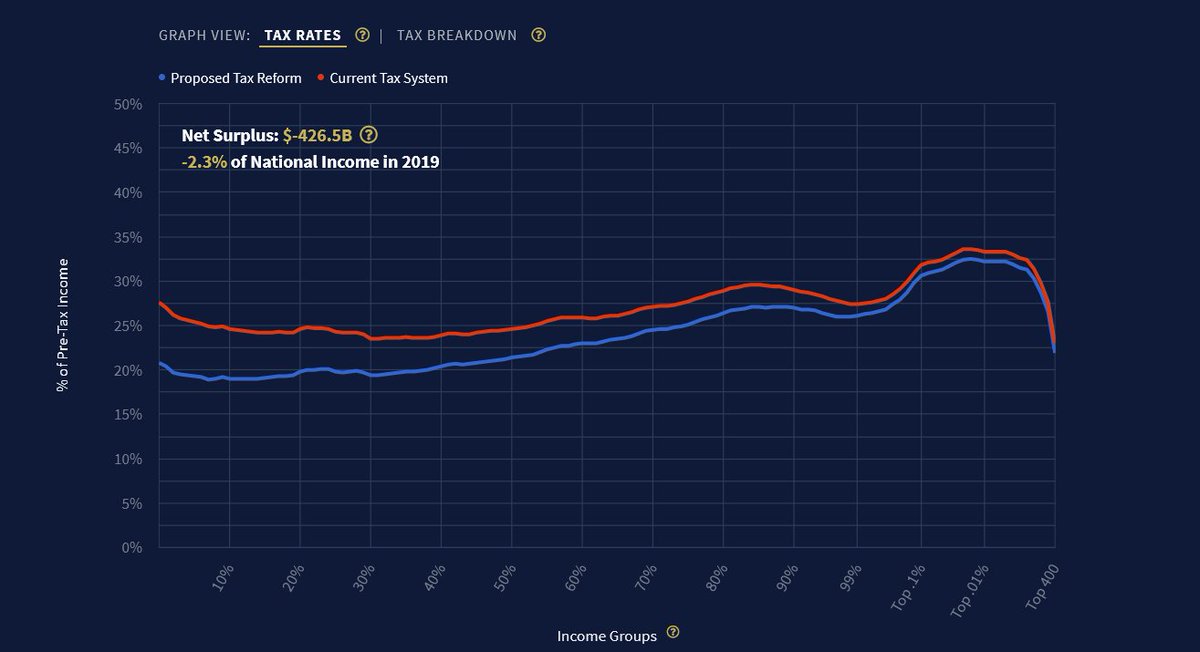
So that’s paying for the party. What about getting there? Let’s talk about school. This is something else that has changed since Fussell’s day, and it deserves some looking at it. What does schooling look like for the classes? For the underclass, school is like an tiny prison. The purpose is discipline. Rarely can enough order be imposed to teach anything, and the students often aren’t terribly interested in learning anything anyways. These schools are usually failing. Teach For America kids go here. The working class will send their kids to whatever’s around. They don’t have the luxury of uprooting to chase a school. This can be good, this can be bad. For what it’s worth, I had a working class Latina classmate in Calc, and these people get sucked up into the UMC stream. The middle class is the beginning of school consciousness and the desire for a “good school”. Their main goal is to avoid the disorder of the underclass, so for them, “good school” is a euphemism for white school. You can admit that here. Ha! Any school is enough for “college”.
What is alien for Fussell’s generation and probably most of you is what I call “The Thunderdome”. It is a school system of intensive winnowing and it is the main pipeline from which our nation’s elites are produced. This is the form of intense American meritocracy. It begins when the aspirant elite is a toddler. They begin to take IQ tests to qualify for an elite preschool as well as personality screening. The cutoff for these tests is usually somewhere about 130. Some parents make their toddlers do test prep. The stakes are high. If accepted, the Thunderdome begins. The toddler, then child, then teenager, begins to compete with their rival-peers for resources and attention. The best survive, the rest are winnowed. Rank and yank. Ace the test or don’t come back. At every stage, advance. Never fail. A grade that isn’t an A is a permanent black mark on the transcript that will ruin your chances for Harvard. The child must have perfect grades, perfect grades, and perfect extracurriculars. The leadership requirement means they must outmaneuver their rival-peers to take a club. Many cannot handle the pressure. The suicide rate is not insubstantial. Coffee is common. A common coping mechanism beyond caffeine is performance-enhancing drugs. A swift trade in amphetamines has developed, as well as cocaine. Anything to get an edge in the academic race. The winners are the products of “meritocracy”, its blighted fruits. They are, as a rule, both brutal and conformist – conformity is a must to reach “perfection” as defined by a grading rubric. No principles but obedience. No desire but hunger. An Ivy league professor, himself an alumnus, compared the commencement speech he had received, one calling for noblesse oblige and reminding them of their responsibilities, to the one his young students were receiving.
They were told thus:
You are the fruits of meritocracy, and you deserve this and more. The world belongs to you by right. You must take of it. So eat, eat and never be full, and feast until the world’s ending – this is the truth of the world and what is right.
Anyways. On to the upper class. More cheerful! The upper class is schooled and socialized to be affable. Their schooling is not as intensive, generally, because the goal of their education is to make them good members of the upper class: socialites and networkers. For the upper class, the world can be treacherous, so school networks can be some of the most honest and true sources of friendship. In addition, a lot of their education doesn’t just come at school, but exists passively, in their upbringing. The upper middle class is cultured and sophisticated by education and training, the result of 10 hour school days. The upper class absorbs knowledge by osmosis. They end up with a passing knowledge of fine art because everyone knows it. They read books by whim. The goal is to create that charming affability and the perfect manners for which the upper class is famed. Imperturbably fine spirits, level moods, and a willingness to cover. Generosity befits an upper class person. This leads me to manners, but that’s a matter for another day.
A subject conspicuous in its absence from the Fussell book. Money and class are not the same thing, but, of course, they are related. Without money, one cannot maintain the expenditures needed to live above low proledom for long. So then money. For proles, money is a means for consumption. Proles convert money into goods or services and then consume them. For the lower sorts of proles, this consumption is primarily for survival, but the higher proles enjoy many (very expensive) luxury goods like jetskis and boats. Why is this so? Precarity. @acczibit has a concept “Hood Post-Scarcity”, where one can satisfy all one’s needs, but a single emergency would wipe out any savings. Luxury goods are expensive but “cheap” compared to wealth. Money is here today, gone tomorrow. Spend while you can.
As you move into the middle class, incomes are not necessarily higher, and often lower. But the tone is different. The watchword of the middle is “comfortable”. 90% of the time, when you meet someone who self-describes their upbringing as comfortable, that’s middle class. If they describe themselves as upper middle class but have low class consciousness, they’re also middle class. Twitter is a very middle class place – most of its users are middle class. The middle class no longer fears starvation – here is the source of its comfort. Instead, the middle class uses its spare cash for *status*. The middle class is always attempting to keep up with the Joneses, because its key value is respectability. So the middle class is in an arms race to maintain its status. It buys trends because it is forced to *conform*. And why must the middle class conform? Because little separates them from proledom. Certainly not their income. Respectability means keeping up the habits that keep you from becoming another “deplorable”, who often have lots of personal and life drama. Middles live by codes. Because of these material realities, the middle class plays the role of morality police. Their main asset is their home, and the patrolling of morality helps preserve the niceness of their neighborhood – and their net worth.
Remember: Class is downstream of material conditions. Above this, the upper middle. Here, many living expenses are permitted to fall, since the UMC does not have to follow (expensive) trends, while income drastically increases. This creates an inevitable and perpetual surplus. Within a year of graduation, I had >100k. Here begins the accumulation of capital. What is money here? Money is a tool. Money is power. Money is not hoarded, but deployed to useful ends. The UMC readily uses money to solve its problems. But it primarily is a means of accumulating more money and projecting power. Money can be donated to buy influence, and influence can be used to advance the self. Every investment begets further investment. The UMC is funding political movements, research, etc. Bill Gates was born UMC. As Burnham says, the UMC is the strongest part of the ruling class. Now, let us digress.
Imagine the classes as celestial spheres in the firmament. Hydrogen gas is capital.
The life of the underclass is fragmented, bizarre, full of misadventures, prison, and drama. They go from gig to gig, and sometimes prison to prison. They are space debris. If the space debris can cohere, if some semblance of order can be brought to life, then there appears a terrestial planet out of these space rocks. The proletarian has a functioning life now, a routine, and steady work. But no savings. No capital. That can change. When a proletarian internalizes the disciplined living of the middle class, the need to live respectably, it begins to save. It develops a small capital buffer, which is the “comfort” of the middle. The middles are gas giants. They have capital, but it is inert. However, the process of saving is long. Eventually, a successful middle accumulates enough gas that something changes. The capital begins to work upon itself. The gas ignites.
A star is born.
A Novus Homo takes their place among the Nobiles. Which, finally, leads me back on track. The upper class. While the process of entering the nobiles is slow, the ascent of a lesser noble to the greater is exceedingly fast. It happens in the “liquidity moment”. The UMC have, on average, a few million. They’re multimillionaires. In the liquidity moment, one very quickly experiences an increase in wealth in an order of magnitude or multiple orders of magnitude. A critical point is passed and explosive growth occurs.
A star becomes a giant. And what is money for these giants? Everything. Nothing. What is water to a fish?
Money is merely the reality they dwell in.
Fundamentally, the upper class does not understand money. In this, and many other ways, they are the most alien class of all. When I met @babs11111111, he asked me how much my Camry cost. His guess? $500,000.
But at the same time, the upper class can be quite frugal. I make money. For better or for worse, the upper class is beyond making money. That means no more is coming. The Banana Test. I do not know how much a banana costs ($10?) and don’t care to learn. By contrast, Babs knows how much a banana costs, down to the cent, because the principal must be preserved, but for big prices, he has no understanding, while I am shrewd and haggle. The upper class just has money. It’s always there. Like the tap, you turn it on and fill up a glass. But it has to be respected carefully, because one day it might go away forever and never return.
That’s the balancing act. The principal must be preserved, at all costs. From this, we see a material reason why the upper class is fundamentally anti-consumerist (whereas the upper middle is minimalist but can spend a lot). Consumerism would devour the fortune and return them to the lower nobility from whence they came.
Not that that happens often. In the act of rising, the upper middle class striver builds ideologies and movements, which become funded into small NGOs, which grow into large bureaucracies of power in triumph. But what happens after the rise?
The NGOs, finally, begin to do their ostensible goal. Where the UMC spends to create power, the UC is beyond striving. The NGOs stop being a front for a machine (or at least, not their machine), and become real charitable endeavors. The main living of the UC person is to be a socialite, and that means charity, charity, charity. For a long time, the upper class family exists in this kind of philanthropic stasis, throwing many fantastical and spectacular charity galas. But eventually, all things end. At long last, the star’s fuel burns out.
Things begin to change, once more. The final change. An upper class family, spending all its time socializing, builds up deep and wide connections across an entire civilization. Normally, it exists in torpor. When the money ends, it wakes. In its waking, it stirs, and it moves the world. Activity goes out across the connections. This causes the entire civilization to shake. When an UMC family ascends to the upper class, that makes the news.
But the decline and fall of an upper class family? That makes world history. The conditions which create and sustain an upper class family are fundamentally rooted in some reality about material conditions. When those are invalidated, the era is changing.
The liquidity moment is so explosive because its agent becomes an avatar of world historical trends. The ending and undoing of those world historical trends is not only as spectacular, it is more spectacular.
The giant goes supernova.
Elements are scattered to the far solar winds in vast, billowing clouds.
In some distant cloud, the fragments begin to cohere again…
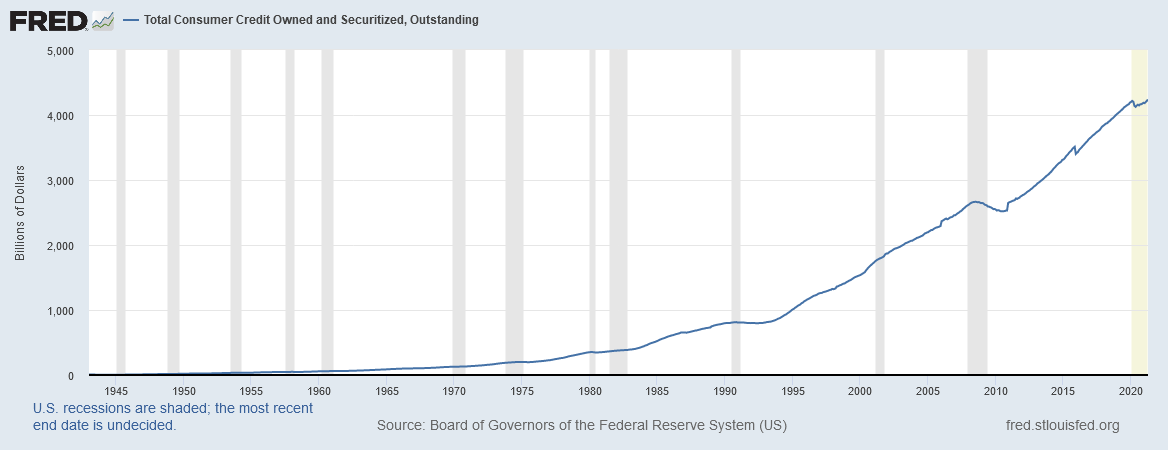
So why does Fussell not talk about money? Part of it is that money played a much less central role back then. And why is that?
Something has happened since the 80s.
Let’s talk about consumer debt.
Do the proles have debt? Yes and no. Many of you are familiar with payday lenders, which charge hundreds of % in interest a year. Now that people have cottoned, they are evolving into “social justice microlenders” that… charge hundreds of % in interest a year. But that’s not the only scheme. Witness CreditOne and other shady credit card companies which charge fees for carrying a balance, fees not carrying a balance, a fee when you pay, an annual fee, etc. Like the NASCAR card (NASCARD). Scams. Or rent-to-own, which started with furniture and appliances, but has actually expanded to housing, with the same exploitative terms. In this context, Walmart’s layaway program, with an APR of 7-20%, like the rest of Walmart, is exploitative but relatively benevolent. Subprime car scams involve setting exorbitant payments and luring customers in with promises of zero or almost zero down, then repossessing the car when they inevitably fail to make the payment. Or they might, like the others, charge really high interest. Which leads to the other side of prole debt. No debt. Proles come to distrust this usury, and for good reason. So the other side of proles is movements like Dave Ramsey and going totally debt-free. It makes sense. The kind of debt they run into is almost all totally predatory.
Leaving the proles behind, how does the middle class interact with debt? The middle class believes in having a sanitary credit score. Why? Because it wants debt. But only some debt. Instead of all-or-nothing, like the proles, the middle class separates out its debts. There is good debt and bad debt, and these differ primarily by category. Good debt includes house debt and at least used to include student debt. Car debt is also considered good debt. Bad debt is debt for frivolous purchases and other things. Credit card debt is bad debt.
This is a middle class credit card ad. Let’s analyze it, shall we? The card level is fairly basic, but it is treated as an aspirational goal (gotten after building credit with a pointless card). This is topped off with the symbolism of climbing a mountain. This act of climbing a mountain on vacation, a status expenditure, is treated as far more important than the boyfriend (not husband). Marriage still carries a lot of cultural cachet with the UMC while it is slowly dissolving in the middle. Class matters in how things are marketed.
So to transition to the UMC, let’s look at an ad for a similar product, but for a higher class. Same thing, different culture.
Like the previous ad, it has a travel motif. But the vibe is artsy. Furthermore, the card opens the beginning of a journey, not the end. While the Gold card is the result of building credit for middles, I got offered one (and similar cards) as a broke, 0 income college student.
In this ad and the next ad, we see the principles of amusement and countersignalling the high – shows you don’t hold it in awe. One of my friends, descended from a colonial governor, wears work boots and T-shirts smeared with truck grease to Whole Foods. The card the Vikings are pitching is one of CapitalOne’s top cards.
Here we have big deal Wes Anderson treated with humor and irreverence. Countersignal the high.
Before I forget – note the importance of family in the sincere commercial! What is the end of the journey she undertakes? A good marriage! Striver middles, take note.
So how does this tie into UMC relations with credit? First of all, everything is cheaper for the rich. As mentioned with Costco, the prices are lower. When I shop on Amazon, I get special Amazon Business Prime discounts not available to the hoi polloi. You apply corporate discounts, that’s another price cut. But the credit cards play into this. When you spend, you get money or points. These programs synergize. On UberEats, I pay with a Samsung wallet discount offer on UberCash, and those purchases earn Marriott points. So I get cashback on the underlying credit card in the wallet, points with Samsung, points with Uber, points with Marriott, and all of these get redeemed in my normal life – on top of cheaper sticker price to begin with. All in all, my prices are probably 20% less. The rich do not go into debt on the same terms as the poor. Like many things, it’s cheaper to be rich.
But the relationship with debt, like money, also differs. Money and debt are both part of one pool, liquidity. It’s all lumped together. What matters is the cost (opportunity cost + APR, cash has APR 0%), availability in crisis (cash is perfect), and liquidity needs. In that sense, debt is not necessarily a meaningful concept. Debt becomes part of a general pattern of money deployment to maximize asset efficiency. It’s not debt, but leverage, to be used wisely. It’s all of a kind.
Now, for the upper class, which has money for everything, why would they need debt? And generally, they don’t. But there are exceptions. When an upper class family begins to decline, they still need to maintain their social and philanthropic obligations. It’s all they know. In those times, you begin to see noble estates take on debt. And as these estates become increasingly indebted, they reach a crisis point. They have to act. Let’s take a look at an example. In the late 19th and early 20th century, a grain glut and economic shifts led to the collapse in value and income of vast landed estates, a ruinous event for great magnates and small alike. In Eastern Europe, the result was communism and collectives run by these very nobles. But in Britain? The great lords decided on marriage. They went across the pond and found wealthy heiresses.
The birth of an Anglo-American empire.
The birth of its champion.
Churchill was the fruit of such a union.
His old (American) home is down the road from my lake house. Like I said, the decline and fall of upper class families? That shapes world history.
That’s all for today.
Yes, hello. As a blog-commenter, I am indisputably of the elect, an humble member of the supreme overlord class. Tell me: what are the “impressions” numbers on your Twatter thread, and how do they compare to the numbers on this heah websyte?
Way, way, way, way higher. On Twitter, it had over 26,000 impressions.
This has like… 50?
Just commenting to say that:
Just commenting to say that:
– I thoroughly enjoyed this article.
– I have read it twice, carefully, on the blog.
– It’s a bit easier to find this article again here rather than on Twitter.
Dear Baron,
Some solid observations as per usual.
A paper was just published that reminded me of your work here:
“Social mobility and political regimes: intergenerational mobility in Hungary, 1949-2017
Bukowski, Pawel, Clark, Gregory, Gáspár, Attila and Peto, Rita (2021) Social mobility and political regimes: intergenerational mobility in Hungary, 1949-2017. International Inequalities Institute Working Papers, 67. International Inequalities Institute, London School of Economics and Political Science, London, UK.”
eprints[dot)lse(dot]ac(dot]uk/110873/
The paper should be available for download – has some interesting conclusions that might be of interest to you. Let me know if the file is no longer available.
Here’s the abstract:
“This paper measures social mobility rates in Hungary 1949-2017, for upper class and underclass families, using surnames to measure social status. In these years there were two very different social regimes. The first was the Hungarian People’s Republic, 1949-1989, a Communist regime with an avowed aim of favouring the working class. Then the modern liberal democracy, 1989-2020, a free-market economy. We find five surprising things. First, social mobility rates were low for both upper- and lower-class families 1949- 2017, with an underlying intergenerational status correlation of 0.6-0.8. Second, social mobility rates under communism were the same as in the subsequent capitalist regime. Third, the Romani minority throughout both periods showed even lower social mobility rates. Fourth, the descendants of the noble class in Hungary in the eighteenth century were still significantly privileged in 1949 and later. And fifth, while social mobility rates did not change measurably during the transition, the composition of the political elite changed fast and sharply.”
-Octavian
Ye, I’ve seen those. Replicates time and time again across countries and regimes.
Come back to Urbit. Get a planet. Cool Kids Chats are for planets only now.